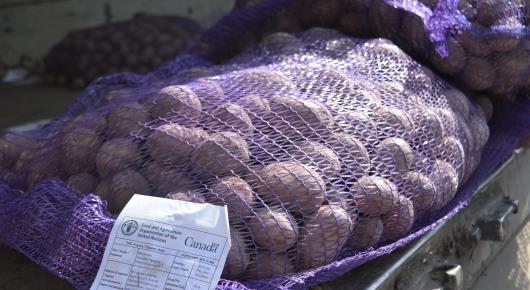FAO delivers seed potatoes for food security in Eastern Ukraine

Some 1 250 rural households along the contact line in the Donetsk and Luhansk regions of Ukraine are receiving seed potatoes this week from the United Nations Food and Agriculture Organization (FAO). The help comes as part of FAO’s emergency response programme in the country, valued at US$ 2.3 million.
Each of the beneficiary households is receiving 100 kilos of certified, highly productive seed potato aimed at increasing self-production of potato as a staple food item. The deliveries come just in time for the planting campaign now under way in eastern Ukraine.
Distribution of the seed potatoes is taking place in nine villages in Luhansk region and 22 villages of Donetsk region – all located within 8 kilometers of the contact line. To enable timely planting, distribution will be carried out speedily during the period from 5 to 8 May.
In recent months FAO supported nearly 700 households in the 15 most hard-to-reach villages along the contact line, with various types of farming inputs. The current round of humanitarian support targets an additional 1 250 households, which suffered significant losses as a result of the military conflict.
All farming inputs distributed by FAO projects in Ukraine – such as seed potato, young animals, concentrated animal feed, hay and others – are procured locally in different regions of Ukraine following issuance of public tenders. In this way FAO supports local producers and the development of local markets for agricultural inputs.
By the end of the summer 2017, FAO’s emergency team in Ukraine plans to procure and distribute chicks, ducklings, turkeys, beekeeping kits, drip irrigation kits and other farming inputs.
“This is a hard time in the conflict area, and it is important that we use the short window of planting season,” said Farrukh Toirov, coordinator of the emergency response programme in Ukraine. “I see an essential need to continue distributing high-quality inputs like vegetable seeds that can improve self-production of food for household consumption and also enrich local markets.
“I am sure that closer engagement in farming activities also provides psychological support and a sigh of relief for rural families,” Toirov added.
FAO’s emergency programme is financed by the Governments of Canada and France, as well as FAO’s own resources. Overall funding is aimed at enhancing food security for more than 45 000 people residing along the contact line in eastern Ukraine.
5 May 2017, Kyiv, Ukraine
